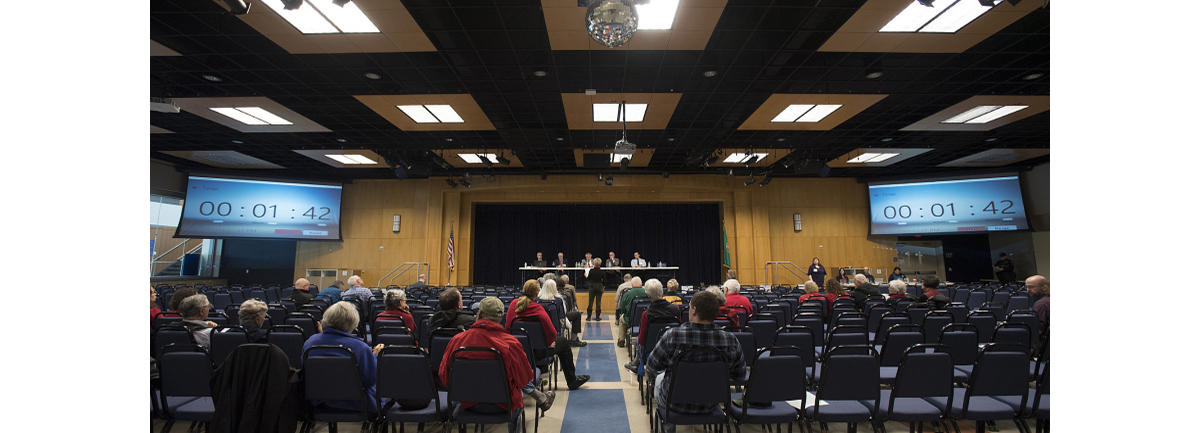
Critics and proponents of the Vancouver Energy oil terminal opined to the Washington Energy Facility Site Evaluation Council during a public hearing Tuesday on a draft construction stormwater discharge permit for the project.
The evaluation council’s decision on the permit won’t serve as a proxy for the terminal itself; it is just one of many steps on the road to the governor’s ultimate decision.
“It’s important to keep the context in mind,” Vancouver Energy General Manager Jared Larrabee said. “This really is a typical standard permit.”
The public hearing was held at Clark College on the final day the evaluation council accepted comments on the draft permit for the Vancouver Energy oil terminal — a joint venture of Tesoro Corp. and Savage Cos. — proposed at the Port of Vancouver.
If approved, the project would be the largest rail-to-marine terminal in the nation, capable of handling up to 360,000 barrels per day, shipped from the oil fields of the Midwest to refineries on the West Coast.
Some speakers took the meeting as an opportunity to speak on the project as a whole, moving Bill Lynch, chairman of the evaluation council, to at least twice remind them to focus on the permit at hand.
Those who supported the permit said Vancouver Energy had a good plan in place to address pollution and runoff issues. Opponents urged the evaluation council to deny the permit, citing the project’s proximity to endangered salmon runs and the river’s water-quality issues.
The stormwater permits are required when a construction project disturbs one or more acres of land and discharges stormwater to state-monitored water bodies such as rivers, creeks or lakes. Under the permit, builders are required to develop plans to prevent stormwater pollution and put in place controls for sediment and erosion.
“This is a permit for when it rains how the stormwater or rainwater is going to be managed during construction,” Larrabee said.
Such permits are typically issued by the state Department of Ecology, but the evaluation council manages construction stormwater general permits on energy projects.
In a joint comment, project opponents Columbia Riverkeeper, Climate Solutions, Friends of the Columbia Gorge, Fruit Valley Neighborhood Association, Sierra Club, Stand, Spokane Riverkeeper, and Washington Environmental Council, called on the evaluation council to require a more specific permit tailored to the project rather than a general one.
“Our overarching message, however, is that given the risks and harm to human health and the environment posed by the Tesoro-Savage project, as well as the fact that the terminal is unnecessary for Washington’s energy future, EFSEC should reject the entire proposal, including this stormwater construction permit, as contrary to the public interest,” wrote Kristen Boyles, attorney for the organizations.
Prior to the meeting, Dan Serres, conservation director of Columbia Riverkeeper, said the Columbia River already has water-quality problems and Vancouver Energy shouldn’t be trusted to protect it.
“They’re pushing an oil train project that is, frankly, reckless,” he said.
For their part, Vancouver Energy officials say the company will take the appropriate steps to meet the permit requirements and operate safely.
“Through this whole process we’ve demonstrated we’re committed to following (evaluation council’s) process and being open and transparent,” Larrabee said. “In the end we believe the facility will be a one that meets the energy needs and demands of the West Coast.”
It’s been more than 3 1/2 years since the terminal was first proposed. The evaluation council is expected to make a recommendation to approve or deny the project by the end of this year or in early 2017. Then Gov. Jay Inslee will use their recommendation to decide the terminal’s ultimate fate.